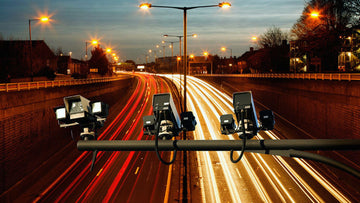
Our comprehensive guide provides all the necessary information about speed awareness courses, which can serve as an alternative to receiving penalty points and fines.
In 2021, alarming statistics revealed that 87% of vehicles exceeded the speed limit in 20mph zones, 51% broke the limit in 30mph zones, and 48% did so on motorways. Consequently, it comes as no surprise that approximately 2.7 million individuals are caught speeding annually, with a comparable number of drivers accumulating three or more penalty points on their licenses.
However, if you find yourself caught for speeding, there may be an opportunity to avoid penalty points by attending a speed awareness course. This guide elucidates the eligibility criteria for participating in such a course and provides insights into what you can expect during your attendance.
What exactly is a speed awareness course?
Rather than simply imposing penalty points and fines as deterrents, these courses are designed to educate drivers about the hazards associated with speeding.
If you were not stopped by the police at the time of the incident, but were caught speeding, you will receive a Notice of Intended Prosecution (NIP) and a 'Section 172 notice' by mail. These notices are addressed to the registered keeper of the vehicle involved, requesting information about the driver at the time of the offense.
Upon assuming responsibility and returning the Section 172 notice (named after the relevant section of the Road Traffic Act that mandates driver identification), one of three possible outcomes will occur:
- You will receive a fixed penalty notice, typically resulting in three penalty points and a fine.
- You will be notified to appear in court, which applies to severe speeding violations or if you already have an accumulation of penalty points on your license.
- You may be offered the opportunity to attend a speed awareness course.
Speed Awarness Course Eligibility
To be eligible for a speed awareness course, the police force that apprehended you must be affiliated with the program. Additionally, these courses are intended for individuals who have committed low-level speeding offenses.
Please note that if you have already completed a speed awareness course within the past three years, you will not be eligible for another course and will automatically receive penalty points instead.
In order to qualify for a speed awareness course, specific criteria are in place to determine the degree by which you exceeded the speed limit.
| Speed limit (mph) | Course-eligible speed (mph) |
| 20 | 24 - 31 |
| 30 | 35 - 42 |
| 40 | 46 - 53 |
| 50 | 57 - 64 |
| 60 | 68 - 75 |
| 70 | 79 - 86 |
What occurs during a speed awareness course?
Typically, speed awareness courses have a duration of four hours for in-person sessions (with a break in the middle) or approximately two and a half hours for online courses. Initially, the COVID-19 pandemic necessitated the shift to online platforms, but face-to-face courses have gradually resumed while online options remain popular.
External facilitators, rather than the police themselves, conduct these courses. Evening and weekend appointments are commonly available, reducing the need to take time off from work.
In-person courses generally accommodate up to 24 drivers, whereas online courses tend to have a maximum of nine participants. The course typically commences with trainers encouraging attendees to share their personal experiences of being caught for speeding.
It's important to note that speed awareness courses focus solely on theory, with no driving involved. Trainers typically cover subjects like the impact of speed on stopping distances, strategies to prevent unintentionally exceeding the speed limit (such as utilizing cruise control or speed limiters), and techniques to ensure sufficient time for completing journeys without feeling the need to rush.
These courses do not include a pass/fail test, although there may be informal quizzes. However, active participation and a positive engagement with the course are expected. If a participant is deemed uncooperative or disruptive, the course administrator may inform the police force, resulting in the imposition of penalty points and a fine that would have otherwise been avoided.
Interestingly, anecdotal evidence suggests that some drivers initially anticipate being lectured, berated, or patronized during a speed awareness course. However, they often find the courses more intriguing, engaging, and thought-provoking than they had imagined.
Cost of Speed Awareness Courses
The cost of speed awareness courses varies depending on the police force responsible for catching you speeding and the course provider they collaborate with. Prices typically range from approximately £75 to £100, with £90 being the common fee.
Locations for Speed Awareness Courses
In-person courses were previously available nationwide, while online courses can now be completed from the convenience of your own home. To participate in an online course, you'll need a quiet room where you can focus without disturbances, a reliable Wi-Fi connection, and a laptop or desktop computer equipped with a webcam.
Booking a Speed Awareness Course
If you receive an offer for a speed awareness course, instructions on how to book a place will be included. Generally, places can be booked either online or over the phone.
Frequently Asked Questions about Speed Awareness Courses
-
How long does a speed awareness course last?
The duration of courses typically ranges from 4.5 to 2.5 hours, including a break. In-person courses usually take longer than online ones. -
How frequently can you attend a speed awareness course?
You are eligible for a speed awareness course once every three years. If you have already completed a course within this timeframe and are caught speeding again, you will not be offered another course. -
Are speed awareness courses still conducted online?
Yes, most speed awareness courses remain online, even though COVID-19 restrictions have largely been lifted. The convenience of online courses has contributed to their continued popularity. -
Does a speed awareness course result in a conviction?
No, one of the advantages of speed awareness courses is that they help you avoid a motoring conviction and penalty points. -
Can you fail a speed awareness course?
While there is no specific "pass/fail" outcome, failing to actively engage with the course or incomplete participation may prompt course providers to notify the police. In such cases, the police are likely to issue the fine and penalty points you would have otherwise received. Unfortunately, course fees are typically non-refundable in these situations. -
Do you need to disclose a speed awareness course to your car insurer?
This remains somewhat uncertain. While many insurers and price-comparison websites do not inquire about attending speed awareness courses, you must disclose this information if asked, or else risk invalidating your policy. To ensure clarity, consult your insurance company regarding the requirement to declare speed awareness courses for your existing policy. -
Why were you not offered a speed awareness course?
There are three potential reasons for not being offered a speed awareness course:
a) The extent by which you exceeded the speed limit did not meet the criteria for eligibility.
b) The police force that caught you does not offer speed awareness courses.
c) You have already completed a course within the past three years.
